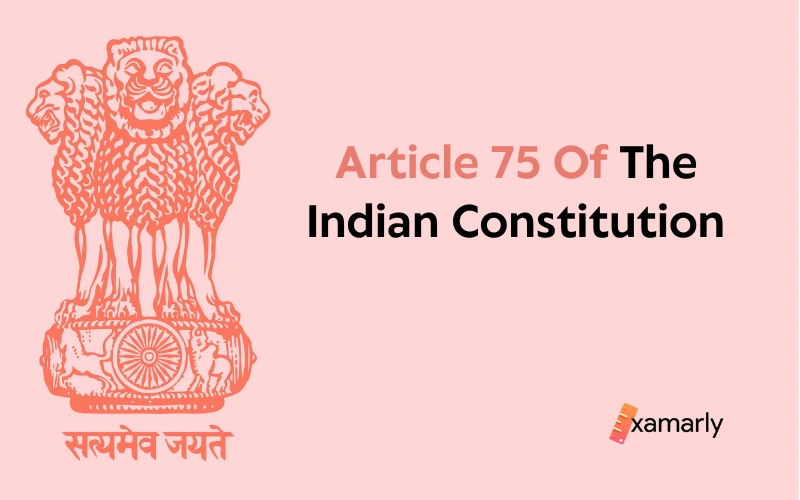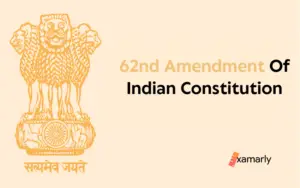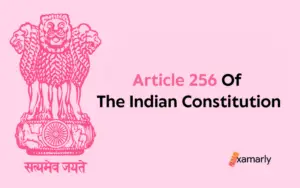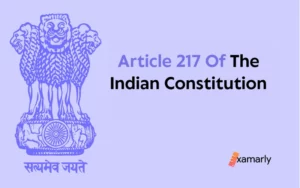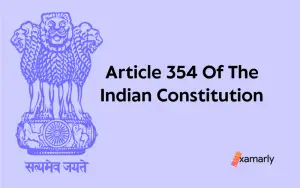The head of the Indian government is known as the prime minister. Although the president of India is the official head of the executive, the prime minister and their appointed Council of Ministers have executive authority.
The Lok Sabha, the Republic of India’s main legislative body, is the lower chamber of the Indian Parliament, and the prime minister is frequently the head of the party or coalition that holds a majority there.
Other Ministerial provisions are covered under Article 75 of the Constitution. Six clauses are used to specifically list these provisions.
The 91st Constitutional Amendment of 2003 significantly changed this in order to reduce the number of ministers nominated, improve accountability, and prevent the abuse of constitutional positions.
- Article 75 Of The Indian Constitution: Constitutional Provisions
- Prime Minister Of India
- Who Is Eligible To Be Chosen As Prime Minister?
- Oaths Of Office And Secrecy
- Why Does The Prime Minister Swear?
- Ministers Responsibility
- Supreme Court Judgements
- Conclusion
- UPSC PYQs
- FAQs
- Which Article Of The Indian Constitution Specifies That The President Shall Appoint The Prime Minister Of The Nation?
- Who Is The Head Of The Indian Government?
- The Head Of The State Of India Is Who?
- Why India Adopted The Parliamentary System Of Government?
- What Is A Responsible Government?
- From Which Country Parliamentary Form Of Government Did India Adopted?
- What Is Oat Of Office And Oath Of Secrecy?
- Who Sets The Prime Minister's Salary And Allowances?
- Which Article Speaks About The Salary And Allowances Of Ministers?
- What Is The Essence Of Collective Responsibility?
- Who Is The Current Prime Minister Of India?
Article 75 Of The Indian Constitution: Constitutional Provisions
The Indian Constitution’s Article 75, which is made up of six clauses, addresses certain requirements relating to the Council of Ministers.
- The President will appoint the Prime Minister, and the President will do the same for the other Ministers, acting on the Prime Minister’s recommendation.
- (A) It is not allowed for the overall number of members of the Council of Ministers, which includes the Prime Minister, to exceed 15% of the total number of representatives in the House of the People.
- (B) For the duration of the time running from the date of his disqualification until the date on which the term of his office as a such member would expire, or where he competes for any election to either House of Parliament before the expiry of that term, a member of either House of Parliament who is a member of any political party and is disqualified for membership in that House under paragraph 2 of the Tenth Schedule is likewise disqualified to be appointed as a Minister under clause (1).
- A minister is supposed to serve at the president’s pleasure.
- The House of People is ultimately responsible for holding the Council of Ministers accountable as a whole.
- Before a minister can begin work, he must take the oaths of office and secrecy, both of which are detailed in the third Schedule of the Constitution and administered by the President.
- If a member of the cabinet does not have a seat in either house of parliament for a period of six months in a row, that minister will lose their position at the conclusion of that period of time.
- Pay and allowances of ministers shall be determined by the Parliament and may be changed at any time by law; however, until such time as the Parliament makes this determination, the wages and allowances of ministers are to be as outlined in the Second Schedule of the Constitution.
Prime Minister Of India
The Prime Minister of India holds an office that is acknowledged to be the most prestigious in India’s parliamentary system of government. He serves as the nation’s de facto leader.
According to Article 75 of the Constitution, the President of India is the one who chooses who would serve as Prime Minister of India. A representative chosen from among the party’s members is designated as the candidate for prime minister by the political party contending in the elections.
In the event that a single party secures a majority of Lok Sabha seats, the President will nominate that party’s elected leader to the position of Prime Minister. In the event that no single political party emerges victorious from the elections, the position of Prime Minister will be left up to the discretion of the President.
Who Is Eligible To Be Chosen As Prime Minister?
A candidate for India’s prime minister should have the following requirements:
- A person who is a citizen of India.
- An individual who is a Rajya Sabha or Lok Sabha member.
- Should have reached the age of thirty if running for the Rajya Sabha and should have reached the age of twenty-five if running for the Lok Sabha.
Read the linked article to learn about the Powers And Functions Of Lok Sabha and Rajya Sabha.
Oaths Of Office And Secrecy
A minister must take the oaths of office and secrecy, which are both outlined in the Third Schedule and administered by the President before he can start working. The Prime Minister swears under oath that
- He / She maintains faith and allegiance to the Indian Constitution.
- He / She will uphold India’s sovereignty and integrity
- He / She will faithfully and diligently carry out the responsibilities of his position
- He / She will do what is right for all kinds of people in accordance with the constitution and the law, without fear, favor, affection, or ill will, and in a manner that is consistent with the constitution and the law.
The Minister swears, in accordance with the Oath of Secrecy, that he will not discuss with anyone any matter that is brought to his attention in his capacity as a minister.
Why Does The Prime Minister Swear?
The Constitution of India does not outline any particular justification for why the Prime Minister of India is required to take an oath.
After reading the official oaths of office and secrecy, however, it becomes clear that taking such an oath is both a legally binding and spiritually significant practice.
During the ceremony in which oaths are taken, the Prime Minister takes an oath in which he swears in the name of God that he is dedicated to upholding the dignity of his position and that he shall maintain the sovereignty and integrity of the country under all circumstances.
Ministers Responsibility
Collective Responsibility
According to the definition of the word “collective,” all of the Council’s ministers must be held accountable for all of their wrongdoings as a group. The Council of Ministers is collectively accountable for the Lok Sabha under Article 75(3) of the Constitution, and under Article 164(2) of the Constitution, they are also collectively accountable for the state’s legislative assembly.
All council members must work together when a policy or bill is brought to the legislature; if there are any divisions among them, they must not be displayed in front of the parliament. All ministers must resign if the Lok Sabha or legislative assembly passes a no-confidence motion against the Council of Ministers. All ministers are required to abide by the decision of the Cabinet Ministers.
Individual Responsibility
Individual responsibility is another notion found in Article 75. The ministers are only in office for as long as the President deems them to be, therefore even though the COM has the support of the lower house of parliament, the President can still dismiss a minister if he so chooses.
At the suggestion of the Prime Minister, however, the President can remove a minister.
Supreme Court Judgements
Following are a few Supreme Court decisions and the key conclusions from each that clarify the scope and meaning of Article 75:
U.N.R. Rao v. Smt. Indira Gandhi
In U.N.R. Rao v. Smt. Indira Gandhi(1971), the court stated that the notion of collective responsibility outlined in Article75(3) extends to all Ministers and that the Council of Ministers must have the confidence of the House of People in accordance with this principle.
S.P Anand v. H.D. Deve Gowda
In the case of S.P Anand v. H.D. Deve Gowda(1996), the Supreme Court ruled that the Constitution does not demonstrate any kind of discrimination, and as a result, the form of oath that is provided in Article75(4) is the same for any Minister and also for the Prime Minister.
Manoj Narula v. Union of India
The court stated in Manoj Narula v. Union of India (2014) that the Prime Minister must conduct himself in a way that upholds the highest norms of public integrity.
In addition, the court instructed the Prime Minister and Chief Ministers to exclude legislators who were the subject of criminal charges.
The court’s reference was only counsel, nevertheless, as the Constitution does not contain any such clauses.
Conclusion
Article 75 revolves around the Prime Minister and CoM. The Prime Minister acts as a link between the Cabinet and the President and is the keystone of the arch that constitutes the Cabinet.
The relationship between the PM and the President is covered in a few provisions of the Articles of the Indian Constitution. Articles 74, 75, and 78 make up the list.
For Further Readings:
UPSC PYQs
IAS candidates should pay close attention to the section titled “Prime Minister and Council of Ministers” throughout all three levels of the exam: the preliminary examination, the main examination, and the interview.
You can have a better idea of the kinds of questions that will be asked in the UPSC Preliminary Exam by looking at some of the questions that were asked in past years’ exams, which are provided below.
Q1. Consider the following statements
1) The Council of Ministers in the Centre shall be collectively responsible to the Parliament.
2) The Union Ministers shall hold the office during the pleasure of the President of India.
3) The Prime Minister shall communicate to the President about the proposals for legislation.
Which of the statements given above is/are correct? (UPSC 2013)
a) 1 only
b) 2 and 3 only
c) 1 and 3 only
d) 1, 2 and 3
Ans b) 2 and 3 only
Explanation: As per Article 75 (3) the Lok Sabha, not the parliament, will be the Council of Ministers’ collective accountability body. Therefore, statement 1 is untrue.
Throughout the pleasure of the Indian President, the Union Ministers will serve in that capacity. As a result, statement two is true.
The President will be informed about the proposed laws by the Prime Minister. Therefore, statement 3 is true.
Q2. There is a parliamentary System of Government in India because the
1. Lok Sabha is elected directly by the people
2. Parliament can amend the Constitution
3. Rajya Sabha cannot be dissolved
4. Council of Ministers is responsible to the Lok Sabha (2015)
Ans 4. The Council of Ministers is responsible to the Lok Sabha
Explanation: The democratic system is represented by Lok Sabha, which is directly elected by the populace. Option 1 is therefore untrue.
According to clause 3 of Article 75, the House of the People holds the Council of Ministers jointly accountable.
A democratic form of government known as a parliamentary system is one in which the executive branch receives its democratic legitimacy from the legislative and is responsible to the latter for its actions (parliament).
A component of the legislative is the Executive. In India, a person cannot join the executive without first being a member of the legislature.
FAQs
The questions that people look for or ask most frequently are listed below. Your study of Article 75 of the Constitution will benefit from reviewing all of these questions as well as the responses to those questions.
Which Article Of The Indian Constitution Specifies That The President Shall Appoint The Prime Minister Of The Nation?
According to Article 75 of the Indian Constitution, the President of India is the one who will make the decision regarding who would serve as Prime Minister of India and appoint him/her for that role.
Who Is The Head Of The Indian Government?
The head of government of the Indian Republic is the Prime Minister, whereas the head of state is the President. The Prime Minister serves as both the political leader and the voice of the people in India.
The Head Of The State Of India Is Who?
The head of state of the Republic of India is the President. He or she serves as both the commander-in-chief of the Indian Armed Forces and the official head of India’s executive, legislative, and judicial branches.
Why India Adopted The Parliamentary System Of Government?
For a number of reasons, India opted for a parliamentary system of governance. During the period of British dominance, parliamentary institutions began to form. The British monarchs operated under this method. In a way, the freedom movement also contributed to the development of India’s parliamentary system of governance. The Indians were accustomed to this form of rule. In the Constituent Assembly, there were numerous debates about the structure of government. A few modifications to the parliamentary system were made by the Constitution’s drafters to make it more suitable for India. India chose to implement a parliamentary form of government as a result.
What Is A Responsible Government?
The legislature is ultimately in charge of holding the Prime Minister and the Council of Ministers accountable for their decisions and actions. This indicates that the Council of Ministers is required to collaborate with the legislature. The parliamentary system is called a “responsible system of government” because of this.
Both the central government and the governments of the individual states are required to operate under a parliamentary system per the Constitution of India. Parliamentary government at the central level is addressed in Articles 74 and 75, while state governments are addressed in Articles 163 and 164. The parliamentary form of government is one in which the legislative holds the executive branch accountable for its decisions and actions.
From Which Country Parliamentary Form Of Government Did India Adopted?
During British colonial authority, the governor-general of India and his executive council were in charge of running the country. This is where the Parliamentary system first emerged. Thus India has adopted the Parliamentary form of government from the British Constitution.
What Is Oat Of Office And Oath Of Secrecy?
One must affirm, as part of the Oath of Office, that they will faithfully carry out their responsibilities and will never exhibit favoritism. The Oath of Secrecy is an assurance sworn by the Minister that they will not disclose any secrets that could jeopardize either directly or indirectly the national security of the country.
Who Sets The Prime Minister’s Salary And Allowances?
Parliament decides from time to time what the Prime Minister of India gets paid and what perks he or she gets. In India, he is paid the same amount of salary and receives the same allowances as other members of the Parliament.
Which Article Speaks About The Salary And Allowances Of Ministers?
Clause 6 of Article 75 speaks about the salary and the allowance that CoM and Prime Ministers receive. It stipulates that Parliament may from time to time by law determine the salaries and allowances of Ministers, and until Parliament so determines, the salaries and allowances of Ministers shall be as stipulated in the Second Schedule.
What Is The Essence Of Collective Responsibility?
One of the key tenets of joint responsibility is that the entire Cabinet of Ministers is answerable for any decision made by any given ministry.
Who Is The Current Prime Minister Of India?
On May 30, 2019, Shri Narendra Modi was given the oath of office necessary to continue serving as Prime Minister of India, marking the beginning of his second term in office. He is the 18th Prime Minister of India and the fourth Prime Minister in Indian history to serve two consecutive terms in office.


